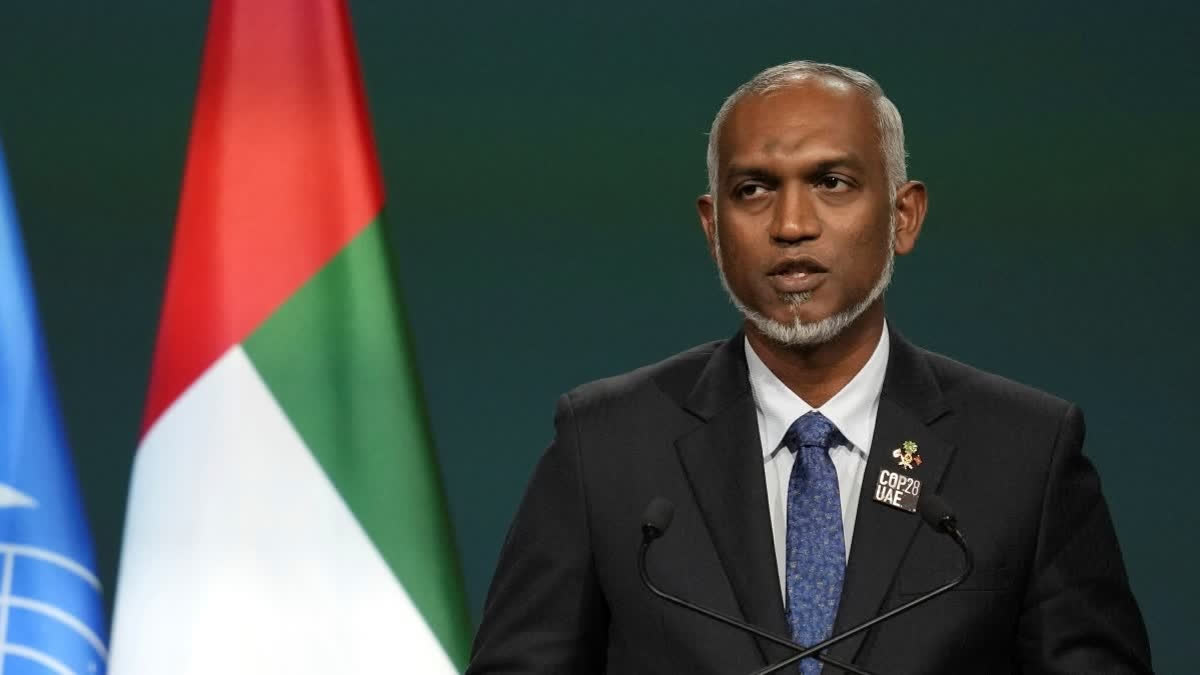New Delhi: With Maldives Parliamentary Minority leader Ali Azim calling for the removal of President Mohamed Muizzu from power amid the ongoing diplomatic row with India, speculations arise as to whether this will be technically possible. “We, d Democrats, r dedicated to upholding d stability of the nation's foreign policy n preventing d isolation of any neighboring country,” Azim,who belongs to the newly formed Democrats party posted on X (formerly Twitter). “R u willing to take all necessary steps to remove prez @MMuizzu from power? Is @MDPSecretariat prepared to initiate a vote of no confidence?”
Will it be possible to remove President Muizzu through a parliamentary vote? And why is Azim asking another party, the Maldivian Democratic Party (MDP), to take the initiative to pass a vote of no confidence? Developments last month in the People’s Majlis, the Maldivian Parliament, indicate that it may be possible to impeach both the President and the Vice-President. In December 2023, the Maldivian Parliament’s regulation was amended granting the MDP the power to impeach the President without requiring support from minority parties. The MDP is in majority in the People’s Majlis now.
The removal of the President and Vice-President can be passed by a two-thirds majority of Parliament, which is 58 out of 87 members. The MDP Parliamentary Group proposed an amendment to change the way the total number of MPs is determined due to the resignation of seven MPs, who have joined the new government of President Muizzu.
With the parliamentary regulation being revised following the resignation of the seven MPs, the total number of MPs now stands at 80. In such a situation, the two-thirds majority stands at 54. The MDP as of now has 56 members in the parliamentary group. This indicates that Parliament does have the power to impeach the President and the Vice-President. So, what is the process?
According to a report in the Maldivian news website edition.mv, with the new amendment to the parliamentary regulation being passed, if Parliament receives a resolution to remove the President and Vice-President, a notice has to be sent within two days, and a Parliament sitting should be convened to proceed with the motion after a 14-day notice from that date.
“According to the amendment, the President and Vice-President have 30 minutes to defend themselves, while three advocates can be appointed to defend against the charges,” the report stated. “They will be allowed to appear before the Parliamentary Committee and file their replies even as the case is still ongoing.”
The new amendment also reduces the number of members of the committee to seven. It is no longer mandatory to include all parties in the committee. According to the pre-amendment regulations, there were supposed to be 11 members in the committee representing all parties. That is why Azim has urged the MDP of former President Ibrahim Solih to take the initiative for a vote of no confidence against Muizzu. What can be the possible fallout?
“Parliamentary elections are scheduled to be held in the Maldives this year,” Anand Kumar, Associate Fellow at the Manohar Parrikar Institute of Defence Studies and Analyses and an expert on the Maldives, told ETV Bharat. “Muizzu will have problems as he will be in the minority,” Kumar said. “He will face difficulties in getting the budget passed and forming the cabinet.”
He said that such a situation would create political uncertainty in the Maldives and would also reduce the elbow space for Muizzu to do things his way. “India will need to closely follow these developments,” Kumar said. “Such developments have significant implications for India.”
A political row broke out between India and the Maldives after Prime Minister Narendra Modi visited the union territory of Lakshadweep in the Arabian Sea and promoted it on social media as an exciting tourism. Though Modi did not mention any other country in his comments, some Maldivian politicians took it as the Lakshadweep being showcased as a rival to the tourism industry in the Indian Ocean archipelago nation. They made disparaging remarks against the Prime Minister and racist comments against Indians in general.
This sparked a social media backlash from Indians, including entertainment world celebrities and sports stars. Many opposition leaders and tourism industry bodies in the Maldives also criticised the Muizzu government for this. Following this, three junior ministers in the Maldives government were suspended.
However, the fact of the matter is that ties between India and the Maldives have been on the downswing ever since pro-China Muizzu assumed office as President last year. Muizzu had won last year’s presidential election on a pronounced anti-India plank. He ran an ‘India Out’ campaign in which he called for the withdrawal of some Indian military personnel present in his country. These personnel are primarily involved in humanitarian assistance and disaster relief work in the Indian Ocean archipelago nation. However, after assuming office, Muizzu made a formal request to India to withdraw these personnel.
Last month, the Maldives decided not to renew a hydrography agreement with India citing national security concerns and the safeguarding of sensitive information. The hydrographic survey agreement was signed on June 8, 2019, during Prime Minister Narendra Modi’s visit to the Maldives. Under the agreement, India was allowed to conduct a comprehensive study of the island nation’s territorial waters, which includes reefs, lagoons, coastlines, ocean currents and tide levels.
And then again, the Maldives decided to allow a Chinese vessel to enter its territorial waters ostensibly to do research work. This decision came despite pressure from the Indian government and concerns raised by various quarters about the vessel being a “spy vessel”. India has strongly been protesting the repeated visits by Chinese vessels to the waters of the south Indian Ocean, a region New Delhi considers to be under its sphere of influence.
In what is the latest manifestation of his pro-China and anti-India stance, Muizzu is now on a nearly a week-long visit to China. This is a break from the practice followed by his three immediate democratically elected predecessors--Ibrahim Solih, Abdulla Yameen and Mohamed Nasheed--who had made India the destination of their first state visit after assuming office. In fact, after assuming office in November last year, Muizzu made Turkey the destination of his first state visit.
As part of New Delhi’s Neighbourhood First Policy, the Maldives is strategically significant to India because of its location in the Indian Ocean. India and the Maldives share ethnic, linguistic, cultural, religious and commercial links steeped in antiquity and enjoy close, cordial and multi-dimensional relations. However, regime instability in the Maldives since 2008 has posed significant challenges to the India-Maldives relationship, particularly in the political and strategic spheres.
Although India continues to be an important partner of the Maldives, New Delhi cannot afford to be complacent over its position and must remain attentive to the developments in the Maldives. India must play a key role within the Indo-Pacific security space to ensure regional security in South Asia and surrounding maritime boundaries. China’s strategic footprint in India’s neighbourhood has increased. The Maldives has emerged as an important ‘pearl’ in China’s ‘String of Pearls’ construct in South Asia.
Tourism plays an important role in the ties between India and the Maldives. The Maldives’ economy is heavily dependent on tourism and the highest number of tourists comprises Indians. According to a report from the Maldivian tourism ministry in December 2023, India has reclaimed its position as the leading source of tourists to the Maldives, surpassing Russia.
According to the Tourism Ministry, 2,05,278 tourists arrived in the Maldives from India till December last year. This is 11.2 per cent of the total tourist arrivals in 2023, according to the news website avas.mv. It stated that India was the market leader in June last year, overtaking Russia. However, in July, Russia regained the top spot, which India has now reclaimed. The Maldives has received 2,03,539 tourists till December 2023 from Russia. Given all this, will the MDP take Azim’s bait and initiate a vote of no confidence against Muizzu to rectify ties with India? Watch this space.
Read more: Maldives President Muizzu urges China to send more tourists after backlash from Indians


